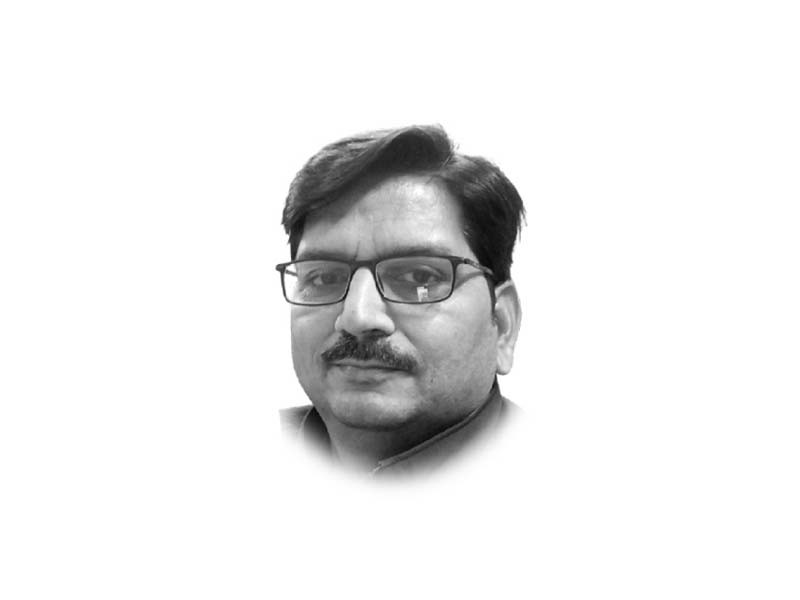
The political scenario in Pakistan is becoming worse day by day. Political parties, nay, factions or sects, strut the political landscape as vendetta-drunk bigots. They target the opponents not in the national interest but to secure their own interests. Then there is a third self-assumed stakeholder in the political process, the security establishment, which has its own view of going about the issues.
The founder of this country had presaged it in his speech at Islamia College Peshawar on 12 April 1946: "Our duty to the State often demands that we must be ready to submerge our individual or provincial interests into the common cause for common good. Our duty to the State comes first: our duty to our province, to our district, to our town and to our village and ourselves comes next."
Mohammad Ali Jinnah's idea of nationalism eschews insular parochialism.
Nationalism is increasingly viewed as a galvanising spirit in world politics. In the 2016 US elections, 'Make America Great Again' leveraged Trump to presidency; 'Take back control' won the Brexit vote in the United Kingdom; French nationalism was embodied in the slogan 'France for the French'; 'Pakistan ka matlab kya, la ilaha illallah' carved out a separate homeland for the Muslims of the subcontinent.
The national interest is what we lack enormously and what has transformed India into the world's fifth largest economy. However, Modi must heed the clarion call of the results of elections this year wherein his party BJP failed to get past 272 majority mark despite its claim of bagging 370. Political analysts blame BJP's ethnic nationalism for the defeat.
The point to discuss India is to lament that our leaders have failed to stir patriotic spirit in our masses. Why? Simply, no one prioritises national interest to theirs. We have ideologues and demagogues in plenty - the political Pied Pipers.
Nationalism is not altogether a wrong phenomenon as long as it prioritises national interest: civic nationalism. It morphoses into jingoism when parochial and ethnic interests are prioritised over national interests; jingoistic nationalism proves ominous for regional and global peace. Canonically, the greatest level of polity - political organisation - is democratic self-government. Polarised polity and populism are in cahoots with each other, forming a nexus that lets politicians hijack democracy for vested interests.
The conundrum is: people think since Pakistan (i.e. the government) has given them nothing, they are not duty-bound to return it - nothing for nothing. A common Pakistani pays taxes on whatever he buys. He dutifully pays the consumer bill of every utility service, say gas, water and electricity. Still, he avails no security of life and property. The blame lies with our politicians because they protect their coterie of the elite and safeguard their own interest. They amass and use public money as their own "hard earned" assets instead of spending their own on the public - the antithesis of what the Quaid envisioned.
Nationalism percolates from higher echelons to lower tiers. Only a genuine leader whose heart overflows with public service as a national duty can inspire his masses to work for the country.
A corrupt leader is the plague of his country, as we see in the Greek tragedian Sophocles' play Oedipus Rex. In the play, the cure of the plague is to find the former king's assassin who is none other than the incumbent king, though he had committed the murder without knowing the identity of the former king. When a crime committed in utter oblivion can turn the perpetrator into a plague for the land, how ominous a ruler would be if he commits self-servingly a crime like corruption.
Pakistan, allegorically, stands plagued but our tragedy is more poignant than the Sophoclean as there is no one who like Oedipus earnestly strives to rid this holy land of the plague which is not unknown in our case unlike the Greek tragedy. Our plague is the vested interests of the politicians, or the Greek gods - wearing boots in our case - for whom "As flies to wanton boys are we to the gods. They kill us for their sport."
When WB Yeats wrote "things fall apart; the centre cannot hold", he didn't mean by 'centre' some kind of moderate political middle or pivot, rather the moral centre of civilisation - the moral centre of national interest. Rarely a better time than this could be to shun our vested interests to join a grand dialogue for a consensus building politico-economic vision.
Already, the diametrical polarity among political parties has eroded people's trust in democracy. Political polarisation tills the national land for populist polity, which makes it much easier for unconscientious politicians to vie for personal interests.
We are recorded in the studies of world bodies as a nation that treaded against the laws of nature. Naturally, maturity and experience come with every passing moment but after over seven decades Pakistan has regressed from its highest economic growth rates in South Asia in its first 20 years after independence to the present state of bankruptcy mired with humongous foreign debts. The present paradoxical predicament is that the government declares it good news when it succeeds in securing a foreign loan.
As our drought of genuine leadership has prolonged to the moment, people provoked by the recent political upheaval in Bangladesh are drawing sociopolitical parallels between Bangladesh and Pakistan, raising the question whether the drought would stir public unrest potent enough to thwart the plundering of national assets by politicians with beggars-can't-be-choosers ethos.
The World Bank's 2019 report titled 'Pakistan @100: Shaping the Future' points out how far behind Pakistan lags in becoming an upper middle-income country by its centennial year 2047: an unsustainable population growth; very high stunting rate of 38% in children compared with 07% in upper middle income countries (UMIC); an atmosphere hostile to investors with the trade volume only accounting for 26% of GDP as against 47% in UMIC; and tax revenue hovering around 13% of GDP as against 21% in UMIC.
To achieve the status of an upper middle income country, Pakistan needs good governance. For that, the report lays stress on untainted transparency and uniform accountability. Only visionary and nationalist leadership can lead Pakistan to achieve its lost glory and move on to celebrate with pride and prestige the centennial year of its independence.





1725784957-0/Tribune-Pic-(17)1725784957-0-165x106.webp)







COMMENTS
Comments are moderated and generally will be posted if they are on-topic and not abusive.
For more information, please see our Comments FAQ